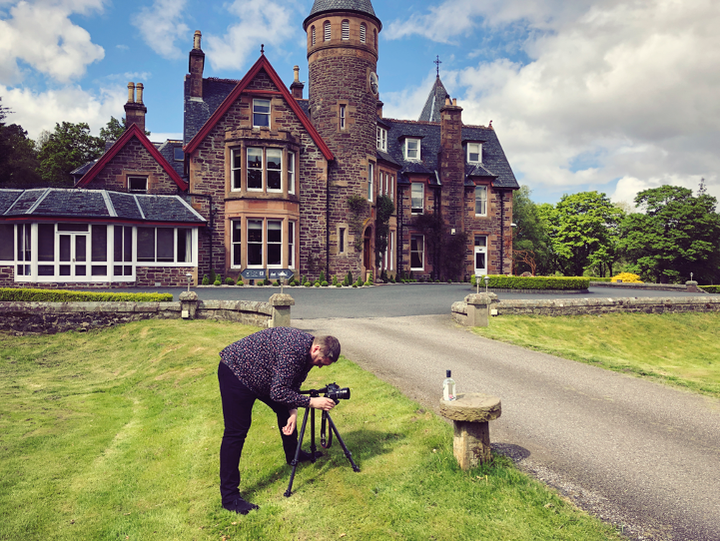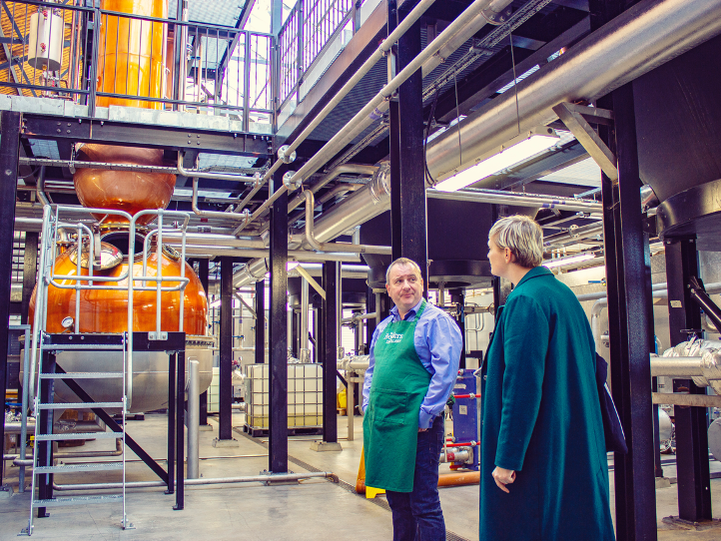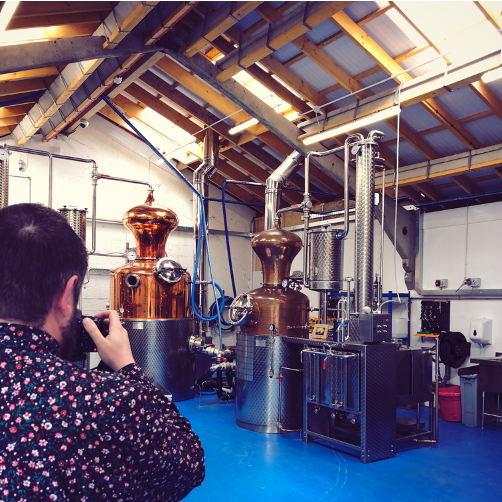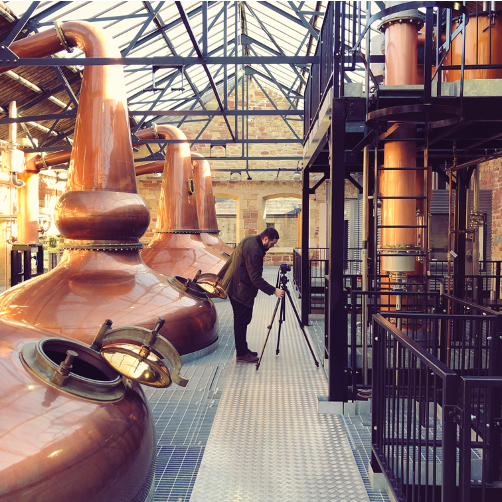Website / Business: The Gin Cooperative Founders / Authors: Martin Reid & Natalie Reid Instagram: @the_gin_cooperative Location: Scotland Summary: The Gin Cooperative was established in 2017 by two long time gin drinkers as a business and platform that helps inspire, educate and encourage consumers and trade to discover Scottish Gin. It is a single, premium resource where people can learn more about not only the many Scottish Gins but also learn about the people, the places and stories behind the bottles and brands. How did you get into gin? Natalie: Martin and I got into gin thanks to my family. I started seeing Martin in 2004 and whenever we would visit my family, especially my dad and family up North, there would always be a G&T on offer. Over time we got more and more into gin and for us it was exciting to see gin go from just a few brands on offer to newer, alternative craft gins like Hendricks’s, Martin Miller, Caorunn appearing behind more bars. I guess you could say our love of gin grew as more variety and brands came to market. Martin: I think gin is something that you almost grow into as your taste matures. I tried gin when I was 18 and didn’t like it. Like many people of my age (I’m 40 this year, ouch!) attitudes towards alcohol have changed a lot. Besides enjoying gin when we visited Nat’s family, I think for me it was really when I tried Martin Miller's Gin for the first time, which I think was around 2006 on a night out with my mates. It was great spotting a new label behind the bar and thinking “why not, I’ll try that.” I was also lucky one of my mates had worked in bars and hospitality for a number of years and had done a variety of drinks workshops and courses as part of his training. Before a night out he would always have something new to try - Martin Miller's Westbourne Strength, Monkey 47 etc, so that also helped me broaden my horizons with gin. Who is your website/social profiles for and why should gin lovers make sure they have a read and follow you? Natalie: You can find us on Facebook, Twitter and Instagram. Our website and social profiles are consumer facing. We believe we appeal to the most curious and dedicated craft gin lovers who want to explore the wonderful world of Scottish Gin. Having said that, inevitably our website has become a valuable tool for on and off trade and the industry. We know this based on the inbound enquiries and feedback, which is great to pass along to our members. We try and create as much original content as we can. As a membership-based business we work hard to share our members' stories and the best way we’ve found to do this is through our various original editorial series. This lets our members tell their stories in their own words and we believe it provides a great opportunity for gin lovers to discover the real people and the real stories behind the amazing Scottish Gin makers and brands. We shoot as much original photography as we can, whether that’s at scheduled photoshoots in bars or on one of our many visits to see our members at their distilleries, we try to be creative and original. Martin: We love reading the latest news and happenings in the world of Scottish Gin and gin and there are so many great resources out there for reading the latest news but we tend to save our news until the end of each month and present a Scottish Gin News Round Up. If we were to publish every press-release (granted it would make our lives easier if all we did was publish press-releases) we wouldn’t be creating anything particularly unique or exciting so we prefer to focus our efforts on creating as much original content as possible. We also run a variety of campaigns on social media to help showcase and highlight our members and their gins. Our membership is open exclusively to the gin makers and brands who actually make their gin in Scotland (full process) so that means distilled, rectified, cold compounded. We don’t work with or promote gins that are completely or party distilled outside of Scotland. It’s a stance we took early on after feeling misled having purchased “Scottish Gin” a few years ago only to discover the gin wasn’t made in Scotland. What defines a Scottish gin and what makes them special? Natalie: I love the fact that the single thing that ties Scottish Gin together is the fact it’s made in Scotland. Geographically it’s what makes Scottish Gin ‘Scottish’. It’s where the creative process happens. It isn’t about the gin style, where the botanicals are from, or the base alcohol, granted some gin makers make their own base spirit and some are able to source/forage for local botanicals, which is brilliant. What makes Scottish Gin great and so accessible is the fact that there are no restrictions, unlike whisky for example, which is highly regulated with definitive criteria. I guess you could say as far as ingredients go, I would hazard a guess every gin made in Scotland uses Scottish Water, hard to say if this plays a massive role or has an impact on flavour but it plays a massive role in whisky production so perhaps there’s a little something special about the quality of our water too. Martin: With our rich history and heritage of distillation in Scotland, Scotland in general in terms of its reputation as a food and drink producing country, is second to none. World famous brands and premium produce are what we as a country are known for. Through a lot of hard work by various organisations like Scotland Food & Drink and others, we’ve managed to shrug off the image of bagpipes and tartan and certainly when it comes to our food and drink sector, we punch well above our weight for the size of our country. Scottish Gin absolutely sits in this category of being a premium product made in Scotland. With so many amazing stories behind the brands, we believe there’s a Scottish Gin out there for everyone, made by people who have genuine, engaging stories that should be discovered. I think it’s part of the reason it’s so easy to fall in love with Scottish Gin, the people and places. There’s a lot of smoke and mirrors in the world of gin - crazy botanicals, long-winded folklore and more. Everything I’ve seen about Scottish Gin as a consumer and someone working in the industry is a genuine love and passion to create something special - brilliant gins backed by brilliant people made in an amazing part of the world with roots in distilling stretching back through generations. What’s not to love. What gins would you always have on your gin shelf and what are some of your favourites at the moment? Natalie: It’s a tough question as one of the things I love about gin is that you can try a gin and think it’s not for me. Go back to that gin a few months later and drink it in a different setting and suddenly you think, ‘wow this is actually very good’. That’s happened to me a few times now so I love rediscovering gins and trying new ones (also a perk of the job!) As a membership based business we’re aways careful to not give our own personal reviews or recommendations, as we treat all Scottish Gins and makers as equals and peers, plus gin is so subjective that everyone’s tastes are different. But personally and absolutely honestly, right now the Scottish Gin that I’ve been exploring and enjoying is LoneWolf Cloudy Lemon, based on the original LoneWolf but with the addition of macerated Sicilian lemons. Undoubtedly still gin in terms of flavour but with a big zesty, citrus burst. I’ve been converted to Negronis for some time now so I continue to explore gins that make a cracking Negroni. I’ve enjoyed Darnley’s Smoke & Zest and Inshriach 57% gins this way recently. Martin: I’ve been enjoying William Kerr’s Borders Gin from The Borders Distillery and The Gael Scottish Gin, both are made using a real malty base spirit, which adds a creamy mouthfeel and what I would describe as a whisky note. I’m not a whisky drinker but I think these two gins are a good place to start for whisky drinkers looking at trying gins that might be a nice introduction to the Scottish Gin category. I’ve just tried some samples of Cairngorm Gin made by Jack Smith, who I believe is not only the youngest Scottish Gin maker but also runs one of the smallest distilleries in Scotland in terms of distillery size and numbers per batch. We were lucky we visited Jack in Carrbridge just before the lockdown so we got a lovely welcome and lots of great insight from Jack and his dad, it’s a real family business. I agree with Natalie that there’s so many great Scottish Gins out there from some of the more established distilleries like Caorunn, Pickering’s, Hendrick’s. Scottish Gin just like the wider gin sector continues to evolve as consumers tastes and preferences dictate what’s popular. My go to though will always be a classic London Dry gin. Juniper, zest, spice, citrus, pine… might have to go and pour one now! If you had to choose a favourite way to serve gin, what would it be? Natalie: I like exploring new cocktails but generally I stick with a handful of classics and favourites - Negroni, Martini, Martinez, Gimlet, French 75. Generally, I still tend to pour a G&T mid week and save a cocktail for the weekend! Martin: I’m ashamed to say it but I’ve never been a cocktail guy. I have tried and enjoyed the Bramble and Gimlet. I’m still trying to find my feet with Negronis (sorry still too bitter for me). I love a classic G&T in a highball, a large chunk of ice, good premium tonic like Schweppes Signature or Walter Gregor’s and a London Dry gin, finished off with a wedge of something simple, like grapefruit or orange. As much as I love the art and skill required to create a flavour profile for a gin, I don’t want to spend an hour putting together the garnish. I guess that’s one thing I love about gin, is that you can drink it how you like without judgment - gin is for everyone and everyone should enjoy it how they like. Do you have any favourite gin bars that you'd recommend to gin lovers? Natalie: We’ve been really lucky with The Gin Cooperative and International Scottish Gin Day, the first of which took place in 2019, that we’ve got to know a number of amazing bartenders and professionals working at some of the world’s best bars. I met Joe Harper at the Beaufort Bar at The Savoy a couple of years ago and was given the royal treatment, the cocktails were out of this world. We then moved onto the American Bar, which was a memorable experience. The setting, the themes of the drinks menu, the bar team - everything just felt very special. I think that’s what experiencing a bar/cocktail bar should be. It should be an experience. It should be a moment that creates an amazing memory. Whether it’s a cocktail on the menu, the decor and staff or just the general ambience. Some bars nail this aspect of customer service and experience whilst delivering amazing drinks. Aberdeen is our closest city and we have some fantastic bars that house some amazing gin collections and cocktails like The Tippling House, The Craftsman and Grape & Grain. Martin: Although I’ve never been, ATLAS Bar in Singapore is at the top of my gin bar destinations. We worked closely with their beverage director last year as part of International Scottish Gin Day and they were amazing. Not only professional and friendly but collaborative and a real pleasure to work with. Their gin collection is second to none, with an art deco inspired bar and gin tower housing over 1,000 gins, it’s a gin lover's heaven on earth. Please Don’t Tell in NYC was brilliant, we loved everything about this very casual but cool speakeasy. Not so much a gin bar but great drinks and great team behind the bar. Closer to home I’ve enjoyed drinks at Gin 71 and The Spiritualist, both in Glasgow. Do you have any favourite gin events that you'd recommend to gin lovers? Natalie: I can speak for both of us on this one. The Gin To My Tonic shows just hit all the right notes. Good selection of gin makers, great venues and the people behind the shows, Em and Paul are just lovely folk who care about gin. As gin drinking friends, they had the idea of putting together events that showcased gin and we admire what they’ve achieved with the shows and festivals. There are a number of Scottish based events that we’ve heard great things about including West Coast Fest and the Bute Gin Festival. What is your top tip for people just starting to discover gin? Natalie: Find a gin style you like and look for other recommendations alongside that flavour profile. Guaranteed, you’ll cross into another flavour profile and it kind of slowly eases your tastebuds into new gin flavours. Of course, we would encourage people to explore our directory if they want to discover Scottish Gins. We’ve added filters so you can sort by regions, year produced, gin style - so this is a great place to start ;-) Martin: I agree with Natalie. Find the flavour you like and explore more gins that fall within that type of gin. Herbaceous, zesty, whatever your preference, there’s a gin out there with your name on it, you maybe just haven’t discovered it yet. Also pay attention to your mixers. Great gin deserves a great mixer. It might sound like a sales pitch but I’ve had so many great gins in bars ruined with a cheap mixer. A good place to start is also minis. Buy a few miniatures and see what you like without buying a larger gin and discovering you don’t like it. What do you see for the future of Scottish Gin and the development of the reputation of Scottish Gin?
Natalie: This isn’t going to be a short answer so you’ll have two stick with me on this one, as Martin and I have a lot of thoughts and feelings about the term Scottish Gin. For right or wrong, Martin and I both believe that the term Scottish Gin should mean a premium spirit made in Scotland. And by made, we mean distilled, rectified, cold compounded (full process) in Scotland and the business making the gin should believe in and champion the term Scottish Gin. We don’t think that gin made outside of Scotland is inferior but when it comes to branding and marketing, using the term Scottish Gin, which has slowly grown a fantastic reputation through the hard work of many people and organisations, ultimately benefits businesses commercially and so we believe this should be reserved for the people and businesses genuinely making gin in Scotland. We things it’s wrong to label and promote gin as ‘Scottish’ when you’ve simply bought a pre-made gin from outside of Scotland and added in a few botanicals. We’ve actually been working on a consumer charter, which we put on hold for now until the current lockdown has passed and we return to some form of normality. But we feel Scottish Gin in particular has a healthy and long future ahead of it. We’ve got the heritage and history of world class distilling, spirits and more as we touched on earlier. Brand Scotland has a massive global appeal, never mind the fact we’re producing brilliant gins. Martin: The gin category in general definitely feels likes there’s a lot of blurring around the edges when it comes to the EU directive surrounding gin production and gin styles/definitions. I’d like to see regions being recognised and place of origin used more. Scottish Gin has quickly become a term in its own right and although there’s not a specific gin style as a gin producing country, the term Scottish Gin continues to grow. Australian Gin is another example of a regional term. I don’t think anyone could say there’s one particular botanical that ties Australian Gins together but the fact they're being made in the same country with skill, passion and care for their producing Australian Gin has quickly grown into a recognised term. I’d like to see more and more gins recognised and marketed by country of origin. English Gin, Welsh Gin, Irish Gin etc so there’s a continued focus on producing great tasting liquids that innovate, push things forward whilst respecting the term gin and more brands using their country of origin as a marker for where their gins are being made. As for Scottish Gin, we will continue to do what we can to support and nurture the term Scottish Gin; for us as a consumer facing business, the term Scottish Gin should mean a premium spirit made in Scotland. Where the botanicals or base spirit comes from shouldn’t be a marker for what makes a Scottish Gin Scottish, it should be about where the creative process happens, where the business is based and do they respect and champion the term Scottish Gin. It’s been a humbling experience going from long time gin drinkers to having a business and voice in the industry. I think we’ve visited over 60 Scottish Gin distilleries over the last two years, which has given us a chance to look behind the curtain of Scottish Gin. The creativity, the care and love of what people are doing and building with their Scottish Gin businesses is inspiring to see. It can be easy to just see a pretty bottle on the shelf at the local bottle shop or supermarket. But knowing first hand the people and the hard work and for many the risks they’ve taken to build a brand, establish a business in Scotland and launch their products, the love of what they do shines through. We’re sure its the same for nearly every gin maker who gets into making gin, they do it for the right reasons and every gin maker we’ve met falls into that category. Doing it for the right reasons, proud to be writing their own chapter in the story of Scottish Gin. A story we feel is just starting and one that we’re passionate about and excited to be sharing with our audience. Head over to The Gin Cooperative to discover Scottish Gins and to read Martin & Natalie's interviews and features on Scottish distilleries! Comments are closed.
|






 RSS Feed
RSS Feed


